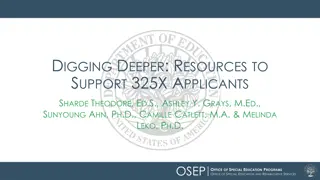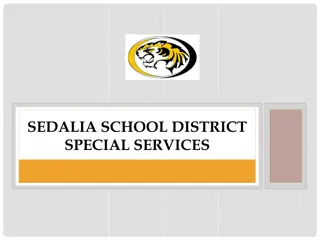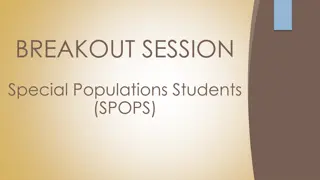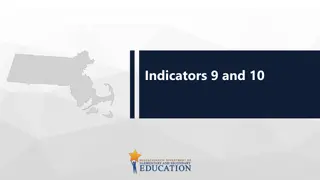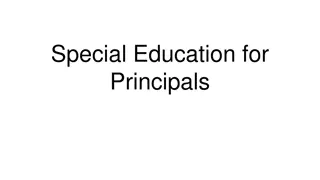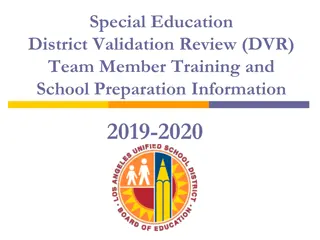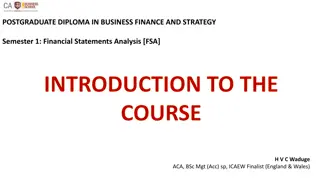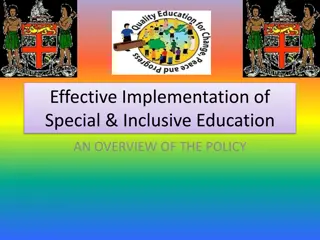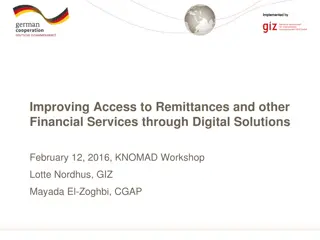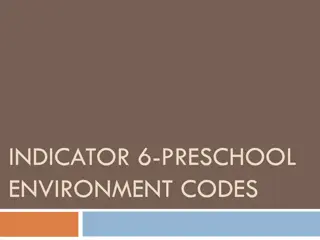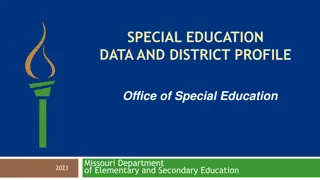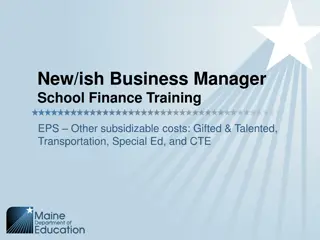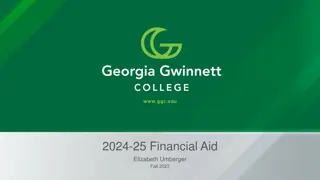Understanding Financial Management of Special Education Programs
Federal IDEA Part B funds support special education programs, helping LEAs implement IDEA. These funds must be used for allowable purposes like special education services, appropriate technology, and early intervening services. It's essential to use IDEA Part B funds to pay for excess costs and supplement state and local funds without supplanting them. Compliance with Excess Cost/Maintenance of Effort requirements is crucial to ensure adequate funding for special education programs. Excess costs are those above the average spent on typical students, emphasizing the importance of supporting students with disabilities effectively.
Download Presentation

Please find below an Image/Link to download the presentation.
The content on the website is provided AS IS for your information and personal use only. It may not be sold, licensed, or shared on other websites without obtaining consent from the author. Download presentation by click this link. If you encounter any issues during the download, it is possible that the publisher has removed the file from their server.
E N D
Presentation Transcript
Financial Management of Special Education Programs Federal IDEA Part B Funds Special Education Services
Federal IDEA Part B Funds IDEA Part B funds are Federal funds the Local Education Agency (LEA) receives to help support the special education program and implement IDEA. All federal funds are to be used on a reimbursement basis only.
Allowable Use of Federal Funds IDEA Part B Federal Funds may be used for: Special Education & Related Services Appropriate Technology for Special Education Coordinated Early Intervening Services
Use of IDEA Part B Funds Funds must be used to: Pay the excess costs of special education and related services. Supplement State and Local funds. Funds must NOT be used to: Supplant or replace State and Local funds. (supplement is to provide or make a supplement to something while supplant is to take the place of; to replace, to supersede).
Excess Cost / Maintenance of Effort Excess Cost/Maintenance of Effort
Excess Cost / Maintenance of Effort IDEA contains two separate requirements for LEAs to ensure sufficient funding for special education programs: Excess Cost Maintenance of Effort (MOE) While these requirements have some similarities, there are separate requirements requiring separate calculations.
Excess Cost Excess costs are costs that are over and above what the LEA spends on average for students enrolled at the elementary and secondary level. Every student enrolled in a public school receives educational support, including students with disabilities. Because a student with a disability is a student entitled to an education first, the concept of excess costs establishes that: Students with disabilities receive educational support like non-disabled students, and IDEA Part B funds only pay for the excess cost of educating students with disabilities.
Excess Cost Districts can view their Excess Cost online through the Oklahoma Cost Accounting System. If an LEA has not met excess cost in both elementary and secondary, the district will be issued a citation, and a reduction in State Aid funding will be imposed.
There are no exceptions for Excess Cost
Maintenance of Effort LEAs must maintain 100% level of expenditures from State and/or Local funds spent on special education and related services.
Maintenance of Effort An LEA may use one of four methods to demonstrate they have met MOE requirements under IDEA. local total expenditures local per capita state and local total expenditures state and local per capita
Maintenance of Effort Oklahoma Cost Accounting System (OCAS) calculates using just 2 ways: The total expenditures of the LEA for special education and related services (state and local). Per capita amount spent on children receiving special education services (state and local). If both, the total amount of expenditures and the per capita amount decreased in the second (i.e., subsequent) year, the LEA has failed to meet the MOE requirement.
Maintenance of Effort Districts are required to input MOE data information when completing their new fiscal year LEA Agreement. IDEA Part B budgets cannot be approved unless the MOE tab has been completed and the district has demonstrated compliance. All MOE data information must match data submitted through Oklahoma Cost Accounting Services (OCAS). LEAs must update the MOE data in their LEA Agreement once their data has been certified through OCAS.
Maintenance of Effort If an LEA receives notification that the MOE requirement has not been met, an opportunity will be provided for the LEA to submit documentation of allowable exceptions.
Maintenance of Effort Exceptions: Voluntary departure, by retirement or otherwise, or departure for just cause, of special education or related services personnel. A decrease in the enrollment of children with disabilities.
Maintenance of Effort Exceptions: The termination of the obligation of the agency, consistent with this part, to provide a program of special education to a particular child with a disability that is an exceptionally costly program, as determined by the SEA, because the child has left the jurisdiction of the agency; has reached the age at which the obligation of the agency to provide Free Appropriate Public Education to the child has terminated; or no longer need the program of special education.
Maintenance of Effort Exceptions: The termination of costly expenditures for long-term purchases, such as the acquisition of equipment or the construction of school facilities; or The assumption of cost by the high cost fund operated by the SEA.
Miscoding is not an Exception
There are no exceptions under IDEA for Covid 19
Maintenance of Effort Oklahoma State Department of Education- Special Education Services (OSDE-SES) can assist your district SES will receive a list of LEAs failing to meet MOE. Working with LEAs, SES will contact and request specific documentation.
Maintenance of Effort LEAs failing to then meet MOE, will be issued a citation, and a reduction to their State Aid funding. Everyone loses when MOE is not met, funds leave your district and our State. Paying the penalty does not reduce your base. You must maintain the MOE base set prior to the penalty.
Assurances, LEA Agreement, and Consolidated Application
Assurances and LEA Agreement Superintendents must complete Assurances and LEA Agreements each year prior to the start of the new fiscal year. Assurances and LEA Agreements are required by law to be completed prior to July 1st. Assurances and LEA Agreements must be completed before the IDEA Consolidated Application will be available.
Assurances and LEA Agreement You will be required to upload specific documentation on your LEA Agreement: District policies and procedures regarding Child Find or the identification process. Policies/Procedures on Discipline/Expulsion.
IDEA Consolidated Application Once the Assurances and LEA Agreement are completed, approved, and the Special Education allocation has been awarded, a district will be able to complete the Consolidated Application.
Use of IDEA Part B Funds IDEA Part B Federal funds must be budgeted in the Grants Management System (GMS). All expenditures must be submitted through the GMS. Expenditures must be necessary and reasonable.
American Rescue Plan The American Rescue Plan (ARP) was signed into law on March 11, 2021, offering the first COVID-19 related targeted IDEA resources to address the challenges faced in ensuring services for children with disabilities. These ARP IDEA supplemental funds are intended to support early intervention and special education services for infants, toddlers, children and youth with disabilities and their families. The guidelines and requirements for the ARP IDEA funds are subject to the same requirements under IDEA and Uniform and Grant Guidance (UGG) as all IDEA funds.
American Rescue Plan LEAs will operate separate budgets for both traditional and ARP IDEA allocations. LEAs are encouraged to budget these supplemental funds for non-recurring activities. ARP IDEA is a one-time funding opportunity that will not be available to sustain ongoing activities such as permanent employees. All IDEA allocations must be combined when addressing Proportionate Share, CEIS/CCEIS, MOE 50% Rule, and COOP/Interlocal transfer.
American Rescue Plan ARP IDEA projects will be as follows: APR-IDEA Flow Through Project 628 APR-IDEA Flow Through Private Project 629 APR-IDEA PreSchool Project 643 APR-IDEA PreSchool Private Project 644 APR-IDEA Early Intervening (CEIS/CCEIS) Project 624
Coordinated Early Intervening Services (CEIS)
Coordinated Early Intervening Services (CEIS) CEIS are services provided to children who are not currently identified as needing special education or related services, but who need additional academic or behavioral support to succeed in general education. LEAs may voluntarily reserve up to 15 percent of their IDEA funds for CEIS. Starting in 2018-2019, LEAs identified as having significant disproportionality will be required to set aside 15 percent of their IDEA funds to provide comprehensive CEIS to children in the LEA, particularly, but not exclusively, to children in those groups that were significantly over identified.
Coordinated Early Intervening Services CEIS is important for identifying and addressing learning difficulties early. Research indicates that the earlier the intervention, the more effective the support and the less severe the learning difficulties will be. Delays in providing support may increase the intensity, and the cost of the services needed to address learning difficulties.
Coordinated Early Intervening Services CEIS activities that may be funded under IDEA include: Provide professional development for teachers and other school staff to enable such personnel to deliver scientifically based academic and behavioral interventions based literacy instruction and where appropriate, instruction on the use of adaptive and instructional software and; Provide educational and behavioral evaluations, services, and supports, including based literacy instruction.
Comprehensive Coordinated Early Intervening Services (CCEIS): Significant Disproportionality
CCEIS / Significant Disproportionality Revised regulations on significant disproportionality (34 CFR 300.636) have been finalized by the Office of Special Education Programs (OSEP). These regulations enforce the use of IDEA funds to be used on mandatory Comprehensive Coordinated Early Intervening Services (CCEIS).
CCEIS / Significant Disproportionality LEAs found to be significantly disproportionate are required to set aside 15 percent of their total allocations (IDEA FlowThrough, IDEA PreSchool, and IDEA ARP FlowThrough and IDEA ARP PreSchool). This would also include allocation adjustments. The LEA must serve children age 3 through grade 12 who are and are not currently identified as needing special education or related services but are in need of additional academic and behavioral support. Funds must be used to identify and address the factors which contributed to the significant disproportionality for the identified category.
CCEIS / Significant Disproportionality LEAs may use CCEIS funds for training, professional development, behavioral evaluations, and supports such as: -Functional Behavioral Assessments -Behavioral Intervention plans But only to the extent to address the factors identified as contributing to the significant disproportionality identified by the State.
CCEIS / Significant Disproportionality LEAs are required to submit a Summary Analysis within their CCEIS application. The summary must be approved through the SES Data Manager prior to any claim approvals.
CCEIS / Significant Disproportionality LEAs required to set aside funds for CCEIS cannot reduce the districts MOE. Funds must supplement not supplant. Funds cannot be used to provide services already required by law. Funds cannot be used to provide services that were paid for with other funds in a previous year.
COOP / Interlocal co-op COOP / co-op
COOP / Interlocal co-op LEAs that select to pool their funds must sign a letter of intent to participate in a special education cooperative arrangement (this is an arrangement that exists under federal law) or an interlocal cooperative (this is a cooperative entity that is created through a specific process under Oklahoma statute 70 O.S. 5-117b. also known as an interlocal co-op ). Participating cooperative LEAs other than interlocal co-ops should elect one LEA to act as the fiscal agent for funds.
COOP / Interlocal co-op All LEA s participating in a COOP/Interlocal coop must complete a COOP/Interlocal Arrangement For Consolidated Funding Application and return to OSDE-SES Finance. This application must be signed by all LEAs participating in a COOP/Interlocal and will instruct OSDE-SES Finance the amount of funding to be transferred to the lead LEA. The transfer of funds must address IDEA B Flow Through and PreSchool funding and ARP Flow Through and ARP PreSchool funding.
COOPERATIVE AND INTERLOCAL DISTRICT ARRANGEMENT FOR CONSOLIDATED FUNDING APPLICATION Local Education Agencies (LEAs) that select to pool their funds must sign this letter of intent to participate in a cooperative or interlocal program. Participating cooperative LEAs other than interlocal cooperatives should elect one LEA to act as the fiscal agent for funds. LEAs participating in a cooperative or interlocal cooperative must receive goods or services from the cooperative. The cooperative cannot act as a flow-through agent, but must provide a program consisting of the provision of goods and/or services (70 O.S. 5-117). It is not allowable for cooperatives or interlocals to pay federal special education funds to participating LEAs without providing goods and/or services. Applications for funds will not be approved if funds are simply flowed to participating LEAs without the provision of either goods or services. Payment will not be made to cooperatives or interlocals who are merely reimbursing participating LEAs. Federal special education funds are paid on a reimbursement basis only, for goods and/or services received. Warrants must be paid prior to the submission of an expenditure report (34 CFR 80.41). The fiscal agent must utilize Fund 12 (Co-op Fund). Public Schools will serve as the fiscal agent for the following districts electing to form a cooperative or interlocal cooperative for special education services (eg., Oklahoma/OSDE (99I099). If not the same, please indicate previous year fiscal agent. County/District Name/Code *IDEA 621 $ Amount or Percentage *ARP 628 $ Amount or Percentage *IDEA 641 $ Amount or Percentage *ARP 643 $ Amount or Percentage Signature of Superintendent Lead Fiscal Agent Participating LEA Participating LEA Participating LEA Participating LEA NOTE: An LEA Agreement for Special Education in Oklahoma and Assurances must be submitted for each LEA participating in the cooperative or interlocal. In addition, each participating LEA is still responsible for the compliance with IDEA Part B of the cooperative or interlocal as it relates to each child of the LEA served by the cooperative or interlocal. Prior to the release of IDEA Part B funds to the cooperative or interlocal, the fiscal agent of the cooperative of interlocal must print this page, obtain each LEA superintendent s signature, and mail an original copy by July 15 to: Oklahoma State Department of Education Special Education Services Suite 411 ATTN: Finance Section 2500 North Lincoln Boulevard Oklahoma City, Oklahoma 73105-4599
COOP / Interlocal co-op LEAs participating in a cooperative arrangement or an interlocal co-op must receive goods or services from the cooperative entity. The special education cooperative cannot act as a flow-through agent, but must provide a program consisting of the provision of goods and/or services (70 O.S. 5-117).
COOP / Interlocal co-op Assurances and LEA Agreement for Special Education must be submitted for each LEA participating in the cooperative or interlocal co- op. In addition, each participating LEA is still responsible for the compliance with IDEA Part B of the cooperative or interlocal as it relates to each child of the LEA served by the cooperative or interlocal.
COOP / Interlocal co-op Each LEA participating in a cooperative arrangement for the provision of special education services retains the responsibility to ensure that each of its students receives a Free Appropriate Public Education (FAPE), so LEAs participating in such arrangements should monitor service provision as necessary to ensure each student is receiving a FAPE.
Submitting Expenditure Reports for Reimbursement of Funds





